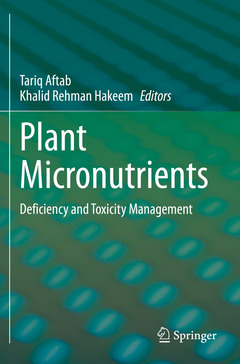Description
Plant Micronutrients, 1st ed. 2020
Deficiency and Toxicity Management
Coordinators: Aftab Tariq, Hakeem Khalid Rehman
Language: English
Subjects for Plant Micronutrients:
Publication date: 08-2021
470 p. · 15.5x23.5 cm · Paperback
Publication date: 08-2020
470 p. · 15.5x23.5 cm · Hardback
Description
/li>Contents
/li>Biography
/li>Comment
/li>
§ Accumulation, partitioning, and bioavailability of micronutrients in plants
Monika A. Wimmer
Institute of Crop Sciences and Resource Conservation Department of Plant Nutrition, University of Bonn, Karlrobert-Kreiten-Strasse 13, 53115 Bonn, Germany
Email: m.wimmer@uni_bonn.de
§ Optimal use efficiency of micronutrients
Samia Oueslati
Franciszek Gorski Institute of Plant Physiology, Polish Academy of Sciences, Krakow
Email: oueslati-samia@yahoo.fr
§ Effects of micronutrient fertilization on the overall quality of the crops
Tariq Aftab
Department of Botany, Aligarh Muslim University, Aligarh, India
Email: tarik.alig@gmail.com
§ Abiotic and biotic stress induced alterations in micronutrients status of plants
Elsayed Fathi Abd_Allah
Department of Plant Production, Faculty of Food and Agricultural Sciences, King Saud University, Riyadh, Saudi Arabia
Email: eabdallah@ksu.edu.sa
§ Biotechnological approaches for increasing micronutrients use efficiency
Raheem Haddad
Department of Agricultural Biotechnology, Faculty of Engineering, Imam Khomeini International University, Qazvin, Islamic Republic of Iran
Email: raheemhaddad@yahoo.co.uk
§ Micronutrients movement and signalling in plants
Jozef Kovacik
Institute of Chemistry and Biochemistry, Faculty of Agronomy, Mendel University in Brno, Zemedelska, Brno, Czech Republic
Email: jozkovacik@yahoo.com
§ Effects of micronutrients on secondary metabolite production
Sheng Qin
The key Laboratory of Biotechnology for Medicinal Plant of Jiangsu Province, School of Life Sciences, Jiangsu Normal University
Email: shengqin@jsnu.edu.cn
§ Hyperaccumulation of potentially toxic elements by plants
Jozef Kovacik
Institute of Chemistry and Biochemistry, Faculty of Agronomy, Mendel University in Brno, Zemedelska, Brno, Czech Republic
Email: jozkovacik@yahoo.com
§ Biofortification technologies used in agriculture in relation to micronutrients
Leon V. Kochian
US Plant, Soil and Nutrition Laboratory, US Department of Agriculture, Agricultural Research Service, Cornell University, Ithaca, New York 14853, USA
Email: LVK1@cornell.edu
§ Spectroscopy and other studies for determination of micronutrients in plants
Doga Selin Kahiyan
Department of Molecular Biology and Genetics, Gebze Technical University, Kocaeli, Turkey
Email: dgumusel@gtu.edu.tr
§ Cycling of micronutrients in the ecosystem
M. Alberdi
Centre of Plant-Soil Interaction and Natural Resources Biotechnology-Scientific and Technological Bioresources Nucleus (BIOREN), University of La Frontera, Casilla, Chile.
Email: malberdi@ufro.cl
§ Application of Nano-carriers for plant micronutrients
Altaf Ahmad
Department of Botany, Aligarh Muslim University, Aligarh, India
Email: ahmadaltaf72@gmail.com
§ Micronutrients use efficiency in plants
Mei Yang
Microelement Research Center, Huazhong Agricultural University, Wuhan, China
Email: yangmei815815@webmail.hzau.edu.cn
§ Proteomic studies of micronutrient deficiency and toxicity
Dan Wang
Tropical Crops Genetic Resources Institute, Chinese Academy of Tropical Agricultural Sciences, China
Email: wang_dan1414@163.com
§ Genomic approaches for micronutrient deficiency and toxicity studies
Tomokazu Kohiba-Koshiba
Department of Biology, Tokyo Metropolitan University, Hachioji-shi, Tokyo, Japan
Email: tomokazu@c.metro-u.ac.jp
§ Role of beneficial elements (Al, Ce, Co, I, La, Na, Se, Si, Ti and V) in agriculture
L. I. Trejo-Téllez
Colegio de Postgraduados Campus Montecillo, Texcoco, State of Mexico, Mexico
Email: tlibia@colpos.mx
Integrates plant micronutrient management with the latest biotechnological and omics approaches
In-depth analysis of the molecular components and pathways triggered by micronutrient deficiency and toxicity
Mechanistic-based solutions to improve plant growth, development, and yield quality




